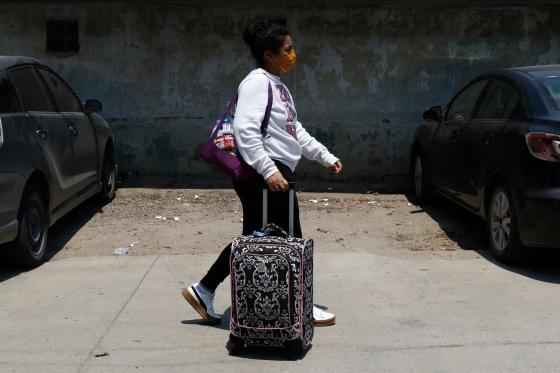U.S. Launches Voluntary Repatriation Flights to Honduras and Colombia
In a notable policy shift, the United States has initiated its first voluntary repatriation flights, returning 68 migrants to their home countries of Honduras and Colombia. This move reflects the administration’s renewed emphasis on managing migration through cooperative and less coercive means amid ongoing debates surrounding border security and humanitarian responsibilities. The voluntary nature of this program marks a departure from traditional forced deportations, aiming to provide migrants with agency while addressing systemic challenges in immigration enforcement.
The migrants, who consented to return voluntarily, were transported under a program designed to alleviate overcrowding in detention centers and expedite case processing. U.S. officials highlighted that the initiative includes comprehensive pre-departure support, such as legal counseling and coordination with the migrants’ countries of origin to ensure safe reception and reintegration assistance.
- Legal advice provided before migrants agree to repatriation
- All travel expenses covered by U.S. authorities
- Collaboration with Honduran and Colombian governments to facilitate reintegration
| Country | Number of Migrants Returned | Date of Departure |
|---|---|---|
| Honduras | 40 | April 15, 2024 |
| Colombia | 28 | April 15, 2024 |
Experts in migration policy suggest that this voluntary repatriation model could serve as a blueprint for future efforts, potentially easing political tensions and offering a more dignified alternative to detention. However, the success of this approach hinges on sustained bilateral cooperation and vigilant oversight to protect migrants’ rights throughout the process.
Obstacles Encountered by Returning Migrants in Honduras and Colombia
Upon returning, migrants face a complex array of challenges that complicate their reintegration into society. Economic hardship is a primary concern, as many returnees struggle to find stable employment in countries where job markets are often limited and informal labor dominates. This economic vulnerability is compounded by social stigma, with some communities harboring negative perceptions of returnees, associating them with failure or criminality.
Access to essential services such as healthcare and education remains uneven, particularly in rural or marginalized regions where many migrants resettle. Security issues also persist, with ongoing violence, political instability, and threats from organized crime groups creating an environment of uncertainty and risk. These factors can sometimes drive returnees to contemplate re-migration, perpetuating a cycle of displacement.
| Challenge | Consequences | Recommended Support |
|---|---|---|
| Economic Hardship | Unemployment, increased poverty risk | Job creation programs, vocational training |
| Social Exclusion | Discrimination, community alienation | Public awareness campaigns, social integration initiatives |
| Limited Service Access | Inadequate healthcare and education | Infrastructure development, outreach services |
| Security Threats | Exposure to violence, gang recruitment | Protection programs, conflict mediation |
Human Rights Implications and International Feedback on Voluntary Deportations
The voluntary repatriation initiative has drawn significant scrutiny from human rights advocates and international bodies. Critics argue that many migrants returned to Honduras and Colombia are fleeing dire circumstances, including pervasive violence, extreme poverty, and political turmoil, raising concerns about their safety and well-being post-return. Human rights organizations stress the importance of individualized assessments to prevent violations of the non-refoulement principle, which forbids returning individuals to environments where they face serious harm.
Global institutions such as the United Nations and immigrant rights groups have called on the U.S. government to maintain transparency and ensure robust support systems for migrants opting for voluntary return. Key issues highlighted include:
- Ensuring migrants have adequate legal representation before consenting to repatriation
- Developing comprehensive reintegration programs in home countries
- Addressing risks of family separation and psychological trauma
| Entity | Primary Concern | Suggested Measures |
|---|---|---|
| United Nations Agencies | Protection of asylum seekers and refugees | Adherence to international human rights standards |
| Human Rights Organizations | Risk of harm upon return | Individualized risk assessments and safeguards |
| U.S. Government | Enforcement of immigration laws | Enhanced transparency and migrant support services |
Strategies to Enhance Reintegration and Support for Returned Migrants
Successful reintegration of returnees demands a comprehensive strategy that addresses both immediate needs and long-term stability. Collaboration between local authorities, non-governmental organizations, and community groups is essential to provide access to healthcare, mental health services, and legal assistance. Establishing dedicated reception centers equipped with resources tailored to returnees’ needs can facilitate smoother transitions and mitigate risks of social exclusion or economic hardship.
Economic empowerment initiatives are vital for sustainable reintegration. Programs offering vocational training aligned with local labor market demands, microcredit schemes, and job placement services enable returnees to regain financial independence. Strengthening social support networks through community engagement and awareness campaigns can reduce stigma and foster inclusion. Recommended actions include:
- Launching public education campaigns to combat discrimination
- Partnering with local enterprises to create employment pathways
- Implementing monitoring systems to evaluate reintegration outcomes and adapt programs accordingly
| Support Focus | Key Initiatives | Expected Benefits |
|---|---|---|
| Healthcare Services | Initial health screenings and ongoing medical care | Enhanced physical and mental health |
| Skills Development | Training programs tailored to local economic needs | Improved employability and income generation |
| Community Integration | Social inclusion initiatives and stigma reduction | Stronger social cohesion and support networks |
Conclusion: Evolving Approaches in U.S. Immigration Enforcement
The U.S. government’s recent voluntary repatriation of 68 migrants to Honduras and Colombia represents a pivotal moment in immigration policy, signaling a move toward more collaborative and humane migration management strategies. As this program develops, its outcomes will be closely observed by policymakers, advocacy groups, and international partners to assess its impact on migrant welfare and migration dynamics. The ongoing evolution of these policies will shape the future landscape of U.S. immigration enforcement and its alignment with humanitarian principles.




